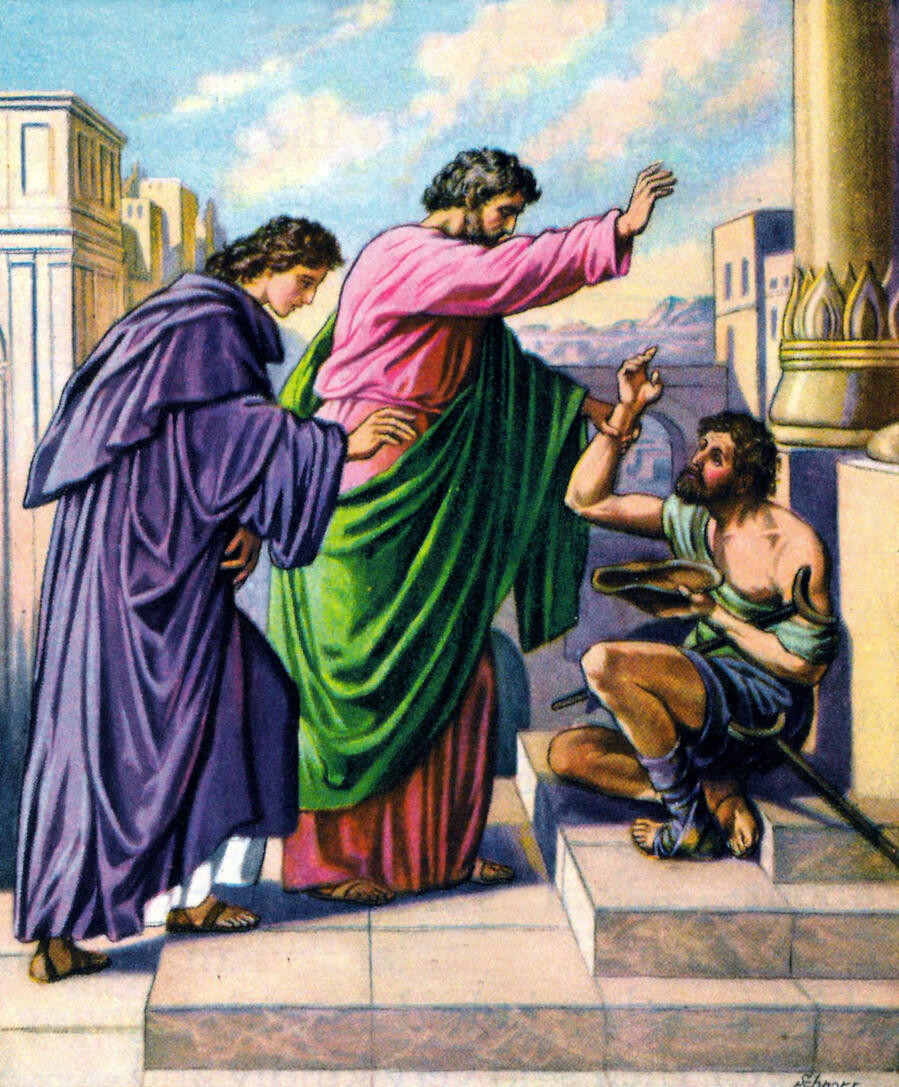
Contact: [email protected]
Click above for story text
Click above for story audio
Click above for story text
Click above for story audio
Click above for story text
Click above for story audio
Click above for story text
Click above for story audio
Click above for story text
Click above for story audio
Click above for story text
Click above for story audio
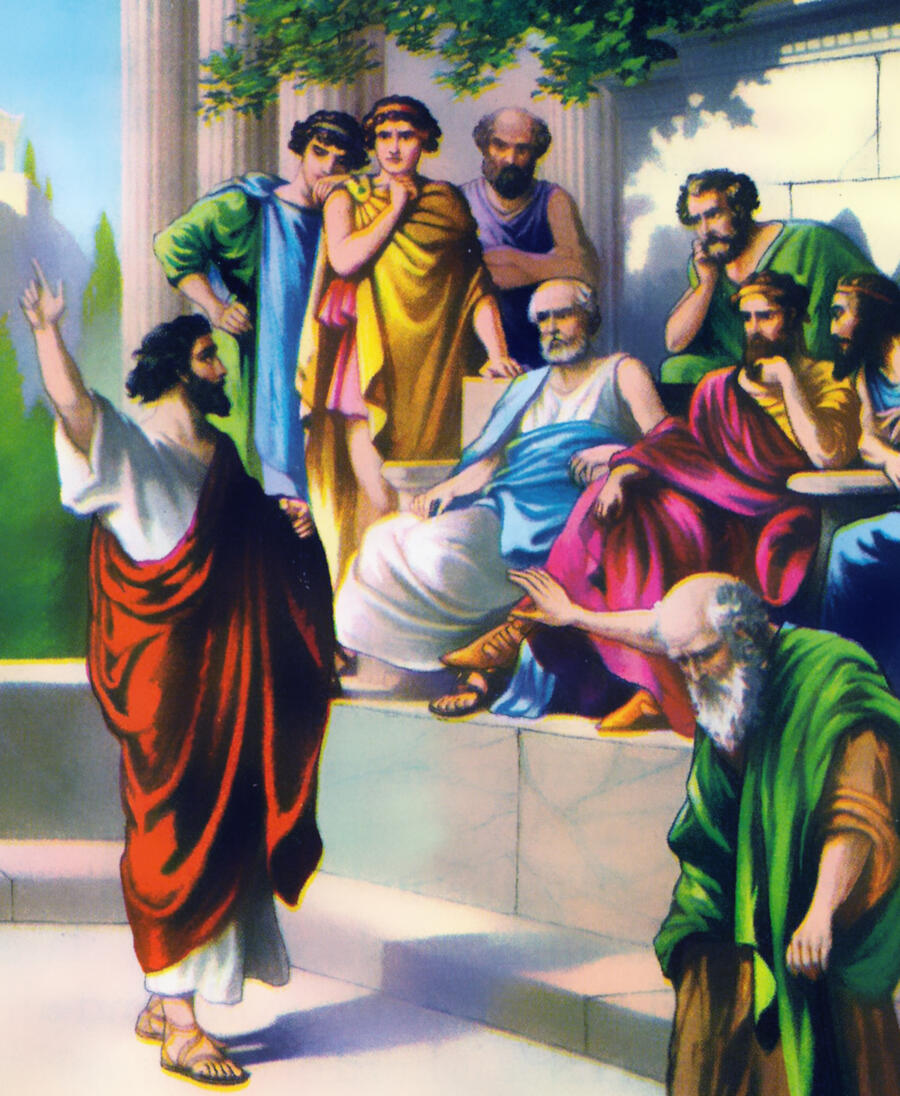
Paul at Athens
From the New Testament Book of Acts
After many troubles and difficulties, Paul at last reached Athens, the capital of Greece, and the most beautiful city in the world.
Paul had proclaimed Jesus Christ as King to many different kinds of people, but now he was to learn how the wisest and most cultured and artistic people would receive his message.
He was guided to Athens by some friends who were obliged to leave him, and as he wandered about the city, he felt lonely in the midst of all these strangers.
Everywhere, as he looked about him, he saw the most wonderful statues of gods and goddesses, carved in snow-white marble. There were so many that the people of those days used to joke and say that it was easier to find a god than a man in Athens. Everywhere also could be seen the exquisitely-built temples of the gods, with their finely-carved pillars of white and colored marble, their ornamental pavements, and their walls adorned with the most wonderful paintings. Athens was indeed like a queen of wonder, for the Athenians were the greatest artists in the world.
But Paul could not find any real pleasure in what he saw, for he remembered that the people were idle and wicked, and either worshipped these foolish gods, or else worshipped their own wisdom. His keen spirit longed to show them the glory of Jesus Christ, and he soon found his way to the Synagogue, and started his work by talking to the Jews. Whether they were friendly to him or not we do not know, but without loss of time he went into the market-place, to talk to the Athenians.
So, day after day, Paul sat there with a little crowd listening, either out of idle curiosity or with genuine interest, as he told the strange story of a God who had come down to earth—not as a great prince or as a mighty warrior, but as a simple peasant, to be despised, and scourged, and spit upon, and crucified.
But this was not all Paul’s message. Jesus Christ had risen from the dead, so he cried out, and was even then standing at the right hand of God. The crowds increased, and the Athenians began to argue with each other as to what this stranger Jew meant; and at last some of the most learned men of the city invited him to come before their council at a place called Areopagus, and explain to them this new religion.
This was a great honor for Paul, according to the Athenians. He had to ascend a wonderful flight of steps, and at the top he found the chief Athenians seated. Paul himself stood forth on a block of stone, and the people crowded up the steps and sat as close as they could, so that they also might hear what he had to say; for the Athenians liked nothing better than to tell or hear of some new thing.
As Paul stood there, he could see below him the idol temples, the altars, the shrines, and the statues, and his heart yearned that some words of his might lead these Athenians to know the true God. So he told them a story of how, as he passed through their city, he had seen an altar bearing the inscription “To the Unknown God”. He explained to the Athenians that he knew they were very religious—so religious, indeed, that in order to be quite sure that no god had been left out, they had put up this altar.
Paul to ended his story by telling them that this Unknown God, whom they were ignorantly worshipping, was in truth the very God about whom he was preaching. He cried:
“The God that made the world, and all things therein, seeing that He is Lord of heaven and earth, dwells not in temples made with hands, as though He needed anything, seeing He gives to all life and breath.”
At first the Athenians listened carefully to what Paul said, but as soon as he began to speak about Jesus Christ having risen from the dead, these wise people began to mock, and to laugh, and to scorn Paul; while some, rather more politely, said they would come and hear about it another day.
Paul was pitifully disappointed, for he knew that no one who mocked at Jesus would ever be a Christian.
Paul went on to Corinth where he preached only Christ and Him Crucified, and made many converts to the Lord.
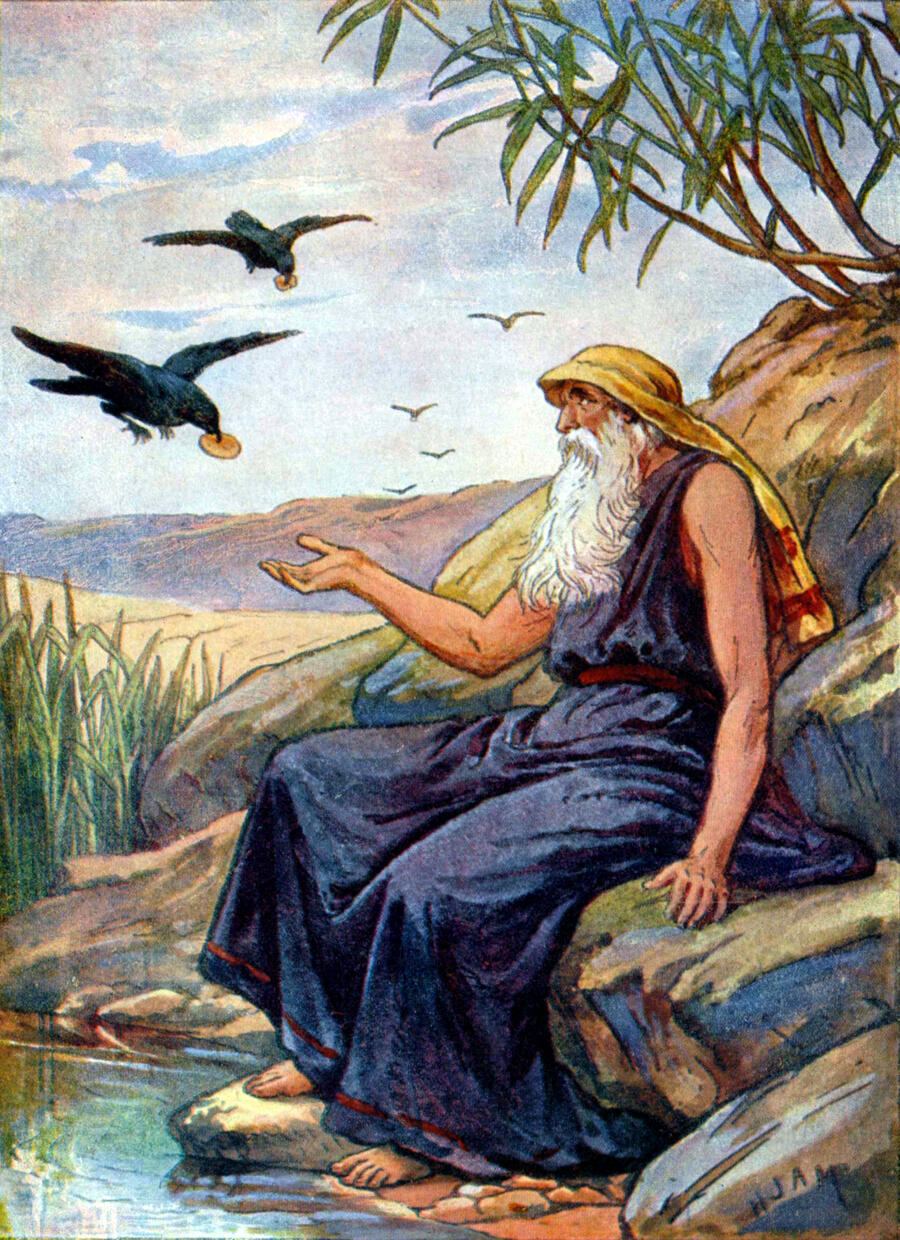
Elijah and the Widow
From the Old Testament Book of First Kings
Ahab was the name of a wicked King who once ruled over the people of Israel. He refused to serve God, and built a temple to the heathen god Baal, and kept four hundred and fifty priests to teach the people to worship idols. Not only so, but he allowed his wife to kill all the Lord’s prophets, save one hundred whom a man named Obadiah hid in a cave.
But God watched all this wickedness, and one day He sent a prophet named Elijah with a message to the King.
“As the Lord God of Israel lives, before whom I stand,” cried Elijah, “ there shall not be dew nor rain these years, but according to my word.”
This was indeed a terrible punishment for Ahab and all the land; but Ahab and his people did not repent, but went on just the same, worshipping Baal and mocking God. Then God sent Elijah away across the Jordan, where he lived quite alone by a little brook, and every morning and evening ravens came and brought him bread and meat to eat, and he drank of the brook.
By and by the brook dried up, but God did not forget his servant, but sent him away westwards to the seacoast.
As he passed along through the country, terrible signs of misery met his gaze. The grass was all dried or burnt up with the hot sun, the animals were dying, and the people were starving. Yet still they and their King refused to repent and turn to God.
When Elijah reached the city of Zarephath, he noticed a widow gathering some sticks. So he called to her and said:
“Fetch me, I pray you a little water in a vessel, that I may drink;” and as she turned to fetch it, he asked her also for a morsel of bread.
But the poor woman answered:
“As the Lord your God lives, I have not a cake, but a handful of meal in the barrel, and a little oil in a jar, and behold, I am gathering two sticks that I may go in and prepare a meal for me and my son, that we may eat it and die.”
But Elijah answered:
“Fear not: go, and do as you have said; but make me a little loaf first, and bring it unto me; and after, make something for you and your son: for thus says the Lord God of Israel, the barrel of meal shall not go empty, neither shall the jar of oil fail, until the day that the Lord sends rain upon the earth.”
So the woman believed Elijah, and invited him to stay at her house, and every day there was meal in the barrel and oil in the jar.
But alas! one day a great trouble came to the woman. Her boy became so very ill that he died. Then she came hurrying in to Elijah, bearing her dead son in her arms, and cried out to him that he had slain her son.
Elijah was not angry with the poor woman in her distress, but spoke kindly, and asked her to give the dead boy to him.
She did so, and Elijah carried the boy away up into the little loft where he slept, and laid him down on his own bed. Then Elijah kneeled and cried to the Lord for help, and afterwards he leaned over the boy three times. Then the Lord heard the voice of Elijah; and the soul of the child came into him again, and he revived.
The poor widow was waiting in grief in her own room. Presently she heard a sound outside; the door opened, Elijah entered, and her boy rushed into her arms.
“See, your son is alive!” said Elijah gently.
Then the woman cried out:
“Now by this I know that you are a man of God, and that the word of the Lord in your mouth is truth.”
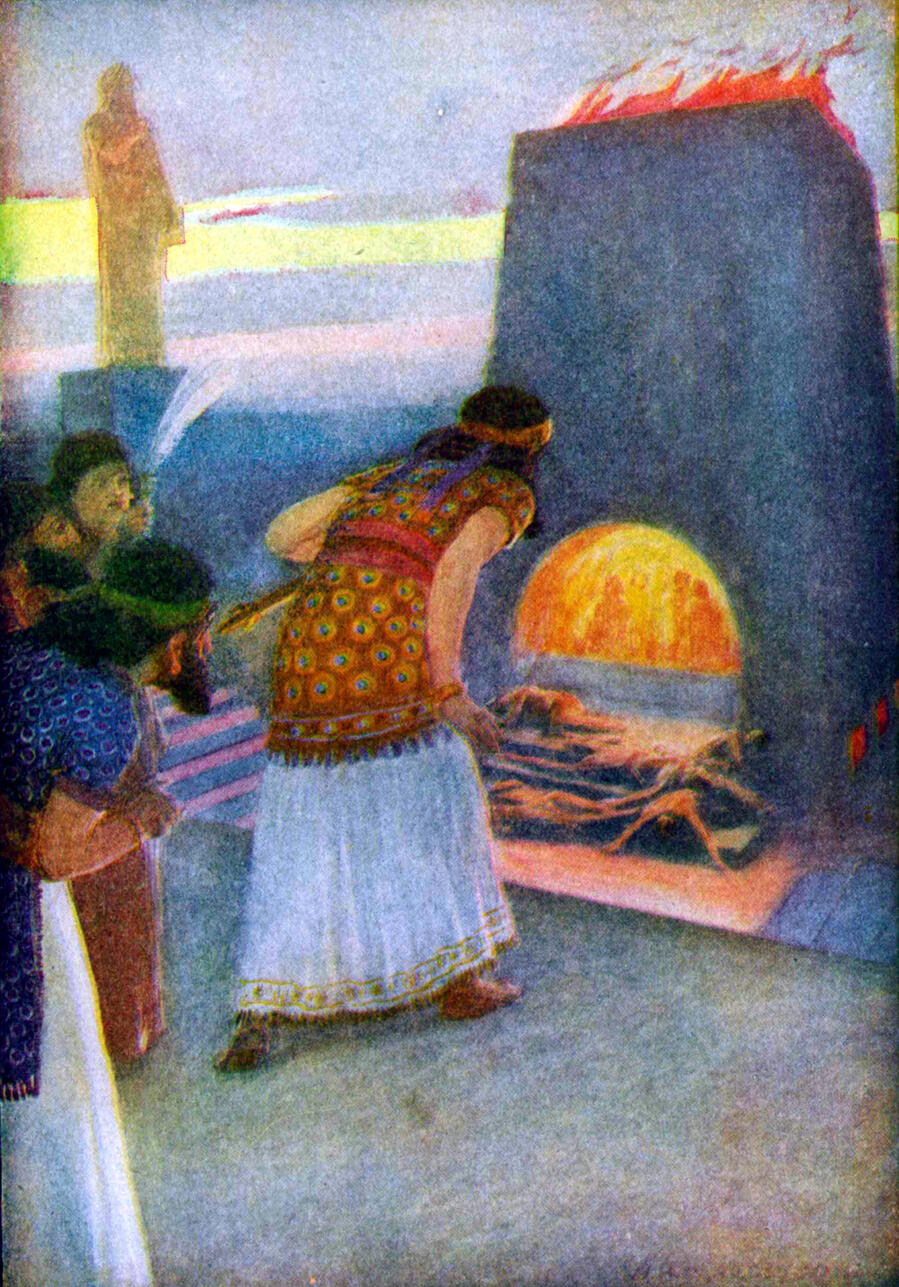
The Fiery Furnace
From the Old Testament Bbook of Daniel
There was a great King of Babylon named Nebuchadnezzar, who fought with all the nations round about, and conquered them. He conquered Egypt, and he conquered the Kingdom of Judah. He took the King of Judah and blinded him and carried him off to Babylon.
He robbed Jerusalem and God’s Temple of the gold and silver and everything precious that it contained, and took thousands of the people away from their homes to Babylon.
And he was so proud that he thought himself as great as a god.
One day he caused a huge image of gold to be made, and set it up on the plain, and commanded that all the nations round about should come, and as soon as they heard the sound of music they were to fall down and worship the image.
But three of the Children of Judah who had been carried away from Jerusalem worshipped the true God, and though they stood on the plain and heard the music, and saw everyone falling down before the image, they stood upright and would not bow.
Then someone went and told the King, who was very angry.
He called the three young men to him and told them that if they did not fall down and worship the next time they heard the music, they would be cast into a burning fiery furnace.
But the young men loved the true God better than their lives, and they faced the great King bravely, as they answered:
“Our God whom we serve is able to deliver us from the burning fiery furnace; and He will deliver us out of your hand, O King. But even if not, be it known unto you, O King, that we will not serve your gods, nor worship the golden image which you have set up.”
Then the King was filled with fury, and he commanded that the furnace should now be heated seven times more than it was normally heated, and ordered the most mighty men that were in his army to bind the three young men and cast them into the burning fiery furnace. So the soldiers bound the three young men, and cast them into the furnace. And the furnace was so terribly hot that the flames shot forth and slew the very soldiers who cast the men into it.
The King now thought he had got rid of everyone who would not bow down to his image; but as he stared into the furnace, a great fear seized him, and he cried to his counsellors:
“Did we not cast three men into the midst of the fire?”
They answered:
“True, O King!”
Then Nebuchadnezzar cried:
“Lo, I see four men loose, walking in the midst of the fire, and they have no hurt; and the form of the fourth is like the Son of God!”
Then the King went near to the mouth of the furnace and called to the three young men to come forth. So they came forth and stood before the King, and everyone saw that there was not a hair of their heads singed, and their clothes were not spoiled, and there was not even the smell of fire upon them.
Then the King was so astonished that he praised and blessed the Lord God of Israel and made a decree that everyone was to worship Him, for he said: “There is no other god that can deliver in such a way.”
Then he promoted the three brave men to be governors in Babylon.
Text
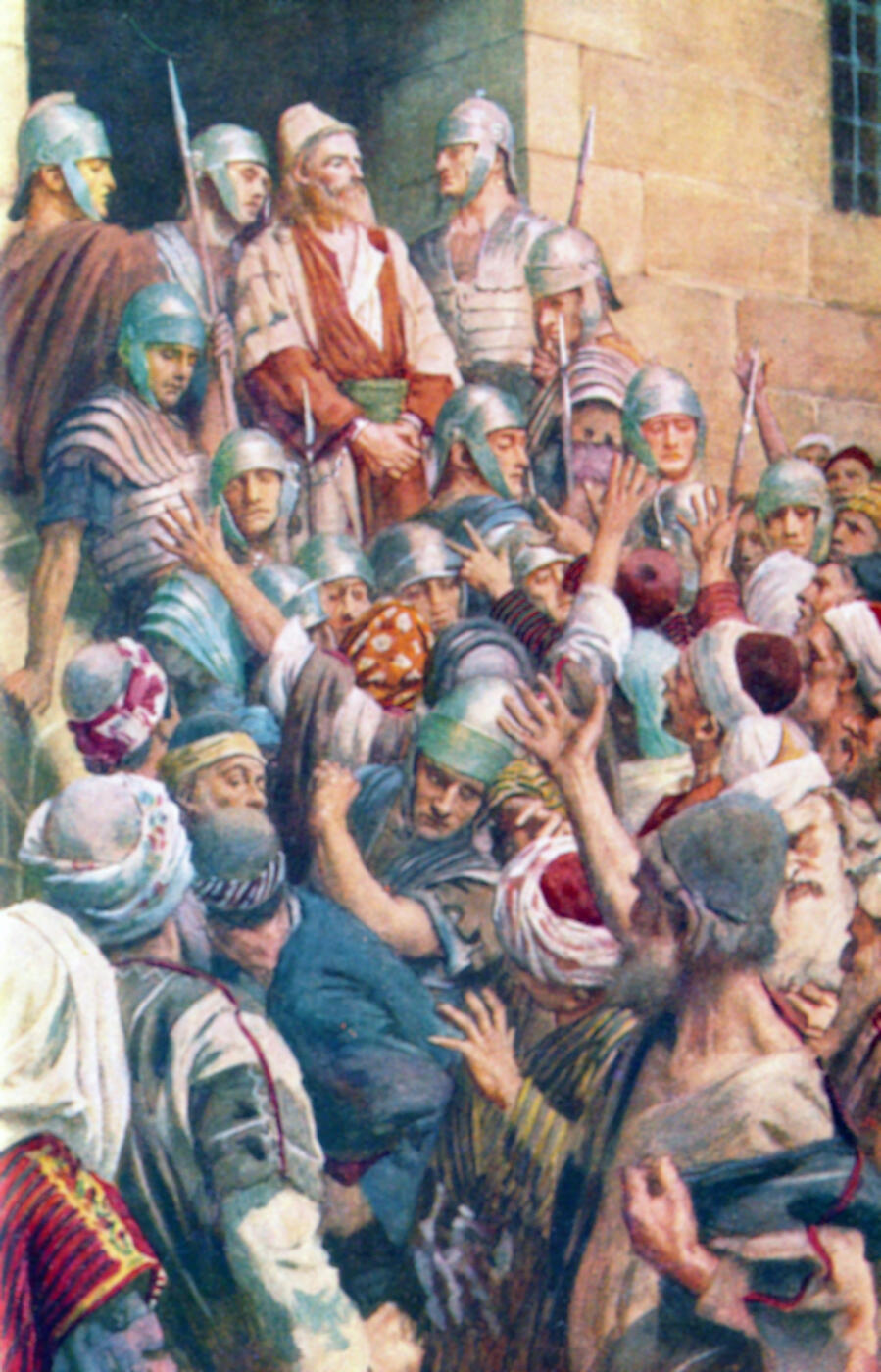
Paul at Jerusalem
From the New Testament Book of Acts
The Apostle Paul, who had been collecting money in Asia and Macedonia for the poor Christians in Jerusalem, had set his heart on going there for the Feast of Pentecost, which was drawing near. So he took ship and sailed by Troas and Ephesus to Miletus.
Now he sent word to his friends, asking them to come to him at Miletus. He wished to say good-bye to them, for he guessed that he would never see them again.
His friends came, and made loud lamentations, and threw their arms round his neck, and kissed him lovingly.
Then they all went down with Paul to the ship, and at last tore themselves away from him, and stood watching, as the vessel pulled up her anchor and then sailed slowly away.
At Jerusalem, the Christians received Paul joyfully, and he passed over to them the great collection of money which had been sent to them by the richer Christians.
Jerusalem was now crowded with Jews from all parts of the world, and after seven days some of them, evil men who wished to harm Paul because he spoke boldly about Jesus Christ, recognized him as he walked in the Temple court, and instantly set up a wild cry to stir up all the Jewish nation against him.
They seized Paul roughly, and cried out at the top of their voices:
“Men of Israel, help! This is the man that teaches all men everywhere against the people and the law and this place!”
At such a time of excitement the people rushed together and seized Paul.
But close to the Temple there was a Roman fortress, where soldiers were continually on the alert to keep order amongst the turbulent Jews.
Instantly they heard the uproar, and a captain and soldiers came down into the crowd, scattering them from right to left, until they reached Paul, who was being terribly beaten by the angry Jews.
The captain, not understanding what was the matter, but thinking that Paul must at least be a dreadful criminal, rescued him, and ordered him to be chained to two soldiers, and then asked who he was and what he had done.
But everyone shouted out a different story, and the captain could make nothing of it all. However, he commanded the soldiers to take their prisoner into the fortress.
But the crowd rushed so fiercely that the soldiers had to take Paul and carry him up the steps.
Paul said quietly to the Tribune, who was the highest in authority: “I am a Jew belonging to Tarsus, and am a citizen of no unimportant city. Give me leave, I pray you, to speak to the people.”
Paul was now growing to be an old man, but the fire of youth was still in him, and the power of the Holy Spirit urged him not to let slip this chance of telling his enemies about Jesus Christ.
Paul, wounded with the beating they had already given him, nevertheless opened his whole heart out to them in one last, grand appeal. He confessed that, at one time, he had done what they were doing, and had persecuted the Christians. He told them how God had met him on the way to Damascus. He told them how he had been guilty of the blood of Stephen; and, last of all, he told them how God had come to him in a vision at Jerusalem, and said to him: “Depart, for I will send thee far hence to the Gentiles!”
The Jews listened breathlessly until Paul came to this part, and then their angry jealousy broke all bounds. They hated the Gentiles, and it maddened them to think that Paul should dare to preach to them.
All the uproar began again, and they even threw dust into the air and tore off their clothes in their wild frenzy. Paul had to return inside the fortress again.
On the following day, Paul was brought before the High Priest. Knowing that some of the leaders were Pharisees and some were Sadducees, who disagreed with each other on many points, Paul cried out, “I am on trial concerning the hope of the resurrection from the dead!”
Immediately a violent dispute broke out. But when the struggle was becoming violent, the Tribune, fearing that Paul would be torn in pieces by the people, ordered the troops to go down and take him from among them by force, and bring him again into the barracks.
That night, poor lonely Paul had a great and comforting joy.
The Lord Himself came and stood by him and said: “Be of good cheer, Paul; for as you have born faithful witness to me in Jerusalem, you shall also bear witness of me at Rome.”
And indeed soon after, Paul left his beloved city for the last time, and started on his long journey as a prisoner, which was to end at Rome and in a martyr’s death.
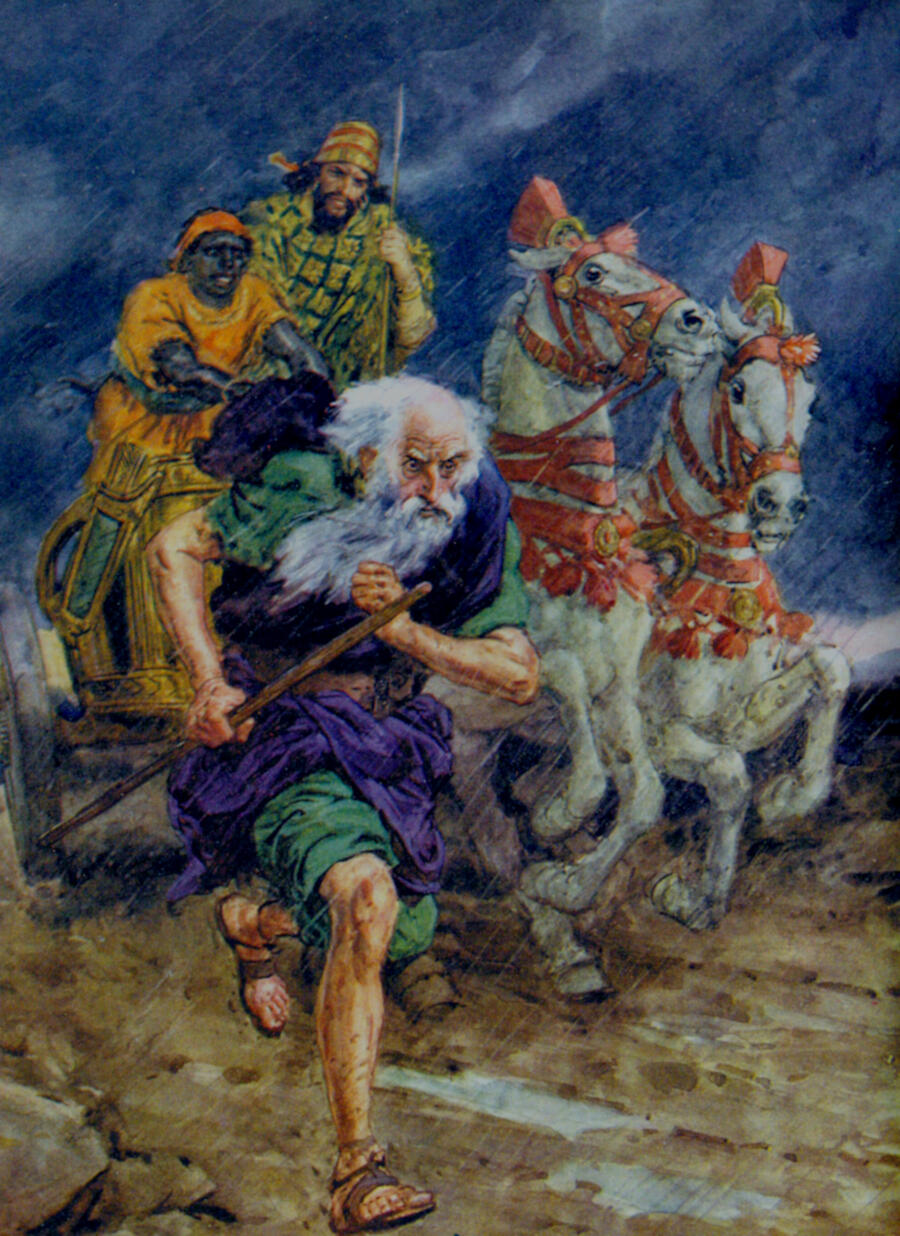
Elijah on Mt. Carmel
From the Old Testament Book of First Kings
The great drought promised by the prophet Elijah was now in its third year. One day, when King Ahab was travelling up the country to see if he could find some springs of water to keep his animals alive, he was suddenly faced by the stern prophet. When Ahab saw Elijah, he called out:
“Is it you, you troubler of Israel?”
But Elijah answered that it was Ahab who had brought all the trouble on the people, by teaching them to worship idols. Then Elijah commanded Ahab to gather the people and all the wicked prophets of Baal together on a high mountain named Carmel.
So Ahab, knowing that Elijah alone could bring the rain back, did exactly as he was told, and the great mass of the people gathered together, wondering what the prophet would do.
Then Elijah stood fearlessly out before them and told them that it was time they made up their minds whether they would serve the true God, or the idol Baal. Elijah cried out:
“If the Lord be God, follow Him; but if Baal, then follow him.”
But the people did not answer a single word. Then Elijah told them of a plan to prove which was the true God.
The prophets of Baal were to build an altar and lay wood on it, and put a dead bullock on the wood, but they must not put any fire under the wood. Then he would build an altar and take a bullock and lay it on the wood, and he also would put no fire under.
All the people were to stand round and watch, and whichever god answered by fire from heaven, he would be the true God.
So the listening people said: “It is well spoken.”
How anxiously they watched as the priests of Baal built their altar, laid the wood and bullock upon it, and began crying out to their false god:
“O Baal, hear us! O Baal, hear us!”
But no fire from heaven came, and no one answered.
Then the priests leaped upon the altar, and cried louder all the morning, until the midday sun was hot above them. And Elijah drew near and mocked them, saying:
“Cry with a great voice, for he is a god; either he is talking, or he is on a journey, or maybe he is asleep and must be woke up.”
Then the priests cried louder, and cut themselves with knives, thinking that Baal might answer if he saw their blood. But there was no voice; no one answered, no one heeded.
At last it was Elijah’s turn, and he cried to the people to come near.
He rebuilt an altar of the Lord which had been broken down, and then he dug a trench right round it, and cut the bullock in pieces, and laid all in order on the wood. But to show the people quite clearly that he was not going to deceive them, he made them pour four barrels of water three times all over the bullock, the wood, and the altar, and he even filled the trench with water.
And when all was ready, Elijah came close up, and cried to God in these words:
“Lord God of Abraham, Isaac, and of Israel, let it be known this day that You are God in Israel, and that I am your servant, and that I have done all these things at your word. Hear me, O Lord, hear me, that this people may know that you are the Lord God, and that you have turned their hearts back again.”
Then the fire of the Lord fell, and consumed the burnt sacrifice, and the wood, and the stones, and the dust, and licked up the water that was in the trench.
And when the people saw it they fell on their faces; and they said: “The Lord, He is God; the Lord, He is God.”
Then Elijah commanded that all the prophets of Baal should be taken, and every one of them was slain.
After all was over, Elijah went right to the top of the mountain, and flung himself down on the earth, and put his face between his knees.
He told his servant to go and look towards the sea. So his servant went and looked, and returned saying there was nothing. But Elijah told him to go again. The next time he returned and said that he saw a little cloud coming out of the sea, about the size of a man’s hand.
Then Elijah told his servant to hurry down the hill to Ahab and tell him to get into his chariot and drive back to his city in case the rain stopped him.
And every moment the heavens grew blacker, and the clouds came, and the wind blew, and there was a very great rain. And Ahab rode and went to Jezreel. And the hand of the LORD was on Elijah; and he girded up his robe and ran before Ahab’s chariot to the entrance of Jezreel.
